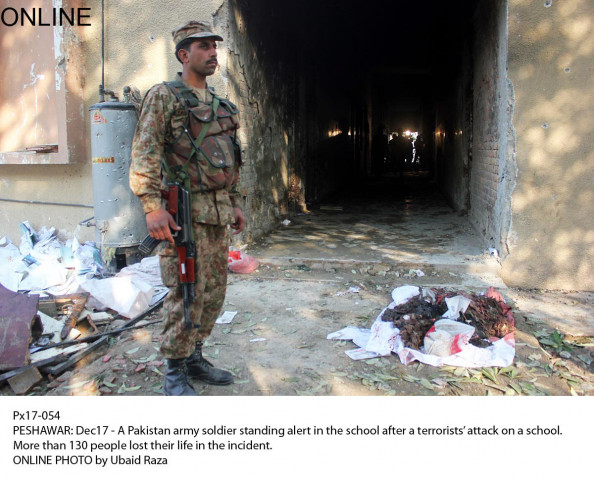Je Suis Army Public School: Rights activists to resume drive from tomorrow
Global civil society to join locals to condemn extremism in the country.

eferring to Zia’s dictatorial regime when these laws were made strict, Nasir said, “I ask countrymen and the parliament, if it was the decision of a democratically-elected parliament [or a dictator]?” PHOTO: ONLINE
Citizens and rights activists, joined by international civil society, will resume their campaign against terrorism by holding protest rallies across the country on January 16 to mark completion of one-month of the terrorist attack on an army-run school in Peshawar killing around 149 people, including 130 schoolchildren.
At the planned protests, calls will be made for action against sympathisers and supporters of the terrorists including Maulana Abdul Aziz, who is illegally occupying position of sermon leader of Lal Masjid.
Demonstrations are scheduled to be held in various cities across the country as well as abroad, announced Jibran Nasir, a Karachi-based lawyer who initiated the campaign after Lal Masjid cleric’s refusal to condemn the Peshawar massacre.
Nasir, flanked by Shan Taseer and Dr Farzana Bari, addressed a news conference at the National Press Club on Wednesday, saying that Pakistanis across the world will hold protests to condemn the school carnage and terrorism.
In Islamabad, citizens and rights activists will assemble outside the Aabpara Police Station on Friday evening, they said.
“We urge all Pakistanis to come out and participate in various gatherings in their respective cities in Pakistan as well as abroad to send a strong message to the Pakistan government and the world that we will no longer tolerate terrorism, extremism and injustice,” Nasir made a passionate appeal.
He also deplored the government’s “zero response” to civil society’s efforts for initiating legal action against Maulana Aziz.
“We have informed Islamabad police high-ups that civil society was not satisfied with the investigations into the case so far,” Nasir said.
“It’s been 25 days since application for incorporation of anti-terrorism clauses to the FIR lodged earlier against Aziz was submitted,” Shan Taseer, son of the slain Punjab governor Salman Taseer, said, who addressed the conference along with Nasir and rights activist Farzana Bari.
Nasir said he had not received any direct threats from Taliban in the recent days but their sympathisers had launched a hate campaign against him on social media labeling him anything but a Muslim.
“My family is staying at an undisclosed location rather our home. I was named by several clerics during Friday sermons but we are not afraid,” the activist said.
Bari said that following December 16 incident some circles of the state showed their serious resolve to fighting terrorism but it could only be achieved if the powerful circles announced to take a U-turn on national security and foreign policies, which led to this situation.
Call for reviewing blasphemy law
They also called for reviewing the controversial blasphemy laws in order to stop their misuse.
Blasphemy laws were first introduced in 1927 during the British colonial era and later amended during the regime of Gen Ziaul Haq.
“Those who formulated the laws were humans and they did it through amendment to the Constitution,” Nasir said to a question adding an amendment could be ratified through another amendment by the parliament.
He was of the view that even Muhammad Ali Jinnah had apprehended that blasphemy laws introduced in 1927 could close doors to serious debate about religion.
Referring to Zia’s dictatorial regime when these laws were made strict, Nasir said, “I ask countrymen and the parliament, if it was the decision of a democratically-elected parliament [or a dictator]?”
Stressing the need for reviewing the blasphemy laws, Bari said that Hudood Ordinance was also promulgated in the name of protection of women [during the Zia regime]. But, she said, in 2005 the then parliament realised that provisions of the ordinance were otherwise and against women.
“Women Protection Ordinance was introduced in 2005, which gave some relief to women targeted due to controversial provisions of the Hudood Ordinance,” Bari said.
Published in The Express Tribune, January 15th, 2015.



















COMMENTS
Comments are moderated and generally will be posted if they are on-topic and not abusive.
For more information, please see our Comments FAQ